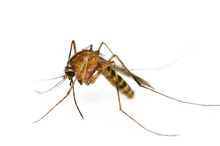The Pennsylvania Department of Environmental Protection announced today that officials had been notified a horse from Lower Saucon Township had to be euthanized because it was suffering from West Nile virus which is spread by the bite of an infected mosquito.
Officials did not have the exact location or the date of the euthanization, but said it was likely done by a veterinarian after testing on the animal indicated an infection.

West Nile virus - bird - mosquito - horse or human
West Nile virus has arrived for 2012 and it is the earliest report of the horse illness since the disease reached Pennsylvania in 2000.
The State Health Department says this case is a sign the virus has arrived for 2012 and it's the earliest report of a horse illness since the disease reached Pennsylvania in 2000. This case also serves as a reminder to vaccinate horses against West Nile Virus.
In the state of Pennsylvania, the WNV program will begin the full-time monitoring, controlling and testing of mosquitoes in April. Collection and testing of dead birds begins on May 1. It was also noted that cattail mosquitoes can transmit both Eastern equine encephalitis and West Nile virus to humans.
DEP spokesman Kevin Sunday said the unseasonably warm weather probably played a factor in the early arrival. "Obviously it's been a very warm winter and mosquitoes like warmth," he said.
Mosquitoes get infected with the West Nile virus by feeding on infected birds. The infected mosquitoes then spread the virus by biting humans and other animals such as horses.
According to the National Weather Service, the average temperature this March in the Allentown area was 50.2 degrees. Historically, the average for the month is 39.8 degrees in the area; this February's average temperature of 36.6 degrees was also about 5 degrees warmer than the historical average, the weather service reports.
Other parts of the country also are experiencing a higher risk of West Nile virus because of the unseasonable warm temperatures. On Thursday, Kentucky's agriculture commissioner warned that the weather could make horses more vulnerable to infection. Health officials in West Virginia expressed similar concerns last week.
Mr. Sunday, from the DEP, said factors other than temperature could also be at play. Wet weather plays a role in part because mosquitoes lay eggs in standing water, he said.
The department spokesman said he's hopeful the case in Lower Saucon Township will serve as a reminder that people should avoid keeping tires, buckets and other items that collect standing water outdoors. He also said the case is an example of why livestock owners should vaccinate their animals against the West Nile Virus.
Dig deeperTM
You might be interested in reading more about West Nile Virus
